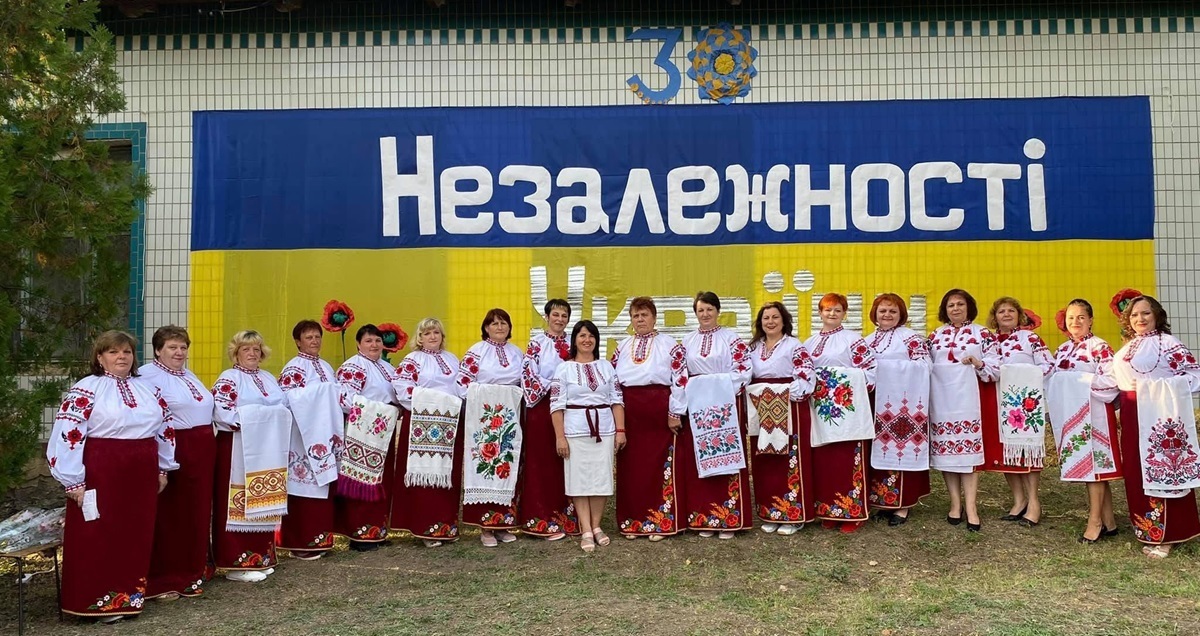From local self-government to the front line: A woman head of a community joined the Armed Forces of Ukraine
In mid-December 2024, Olena Makohon, Head of the Ukrainske community in Dnipropetrovsk region, voluntarily joined the Armed Forces of Ukraine. Now she works seven days a week and risks her life every day, but she is proud to be defending her family, community and state
By Dmytro Syniak
With the outbreak of the full-scale war, many of the people who were supposed to stand up to defend Ukraine in the first place ended up outside the army under various excuses. On the other hand, many people who were unlikely to be seen in uniform took up arms and went to the front. Olena Makohon, Head of the Ukrainske community in Dnipropetrovsk region, is one of the latter. At the end of December 2024, the woman transferred leadership of the community to the secretary of the village council and voluntarily joined the 5th Assault Brigade of the Armed Forces of Ukraine. Ms Makohon shared with Decentralisation.gov.ua how she arrived at this decision and how she sees the future – her own and her community’s – now.
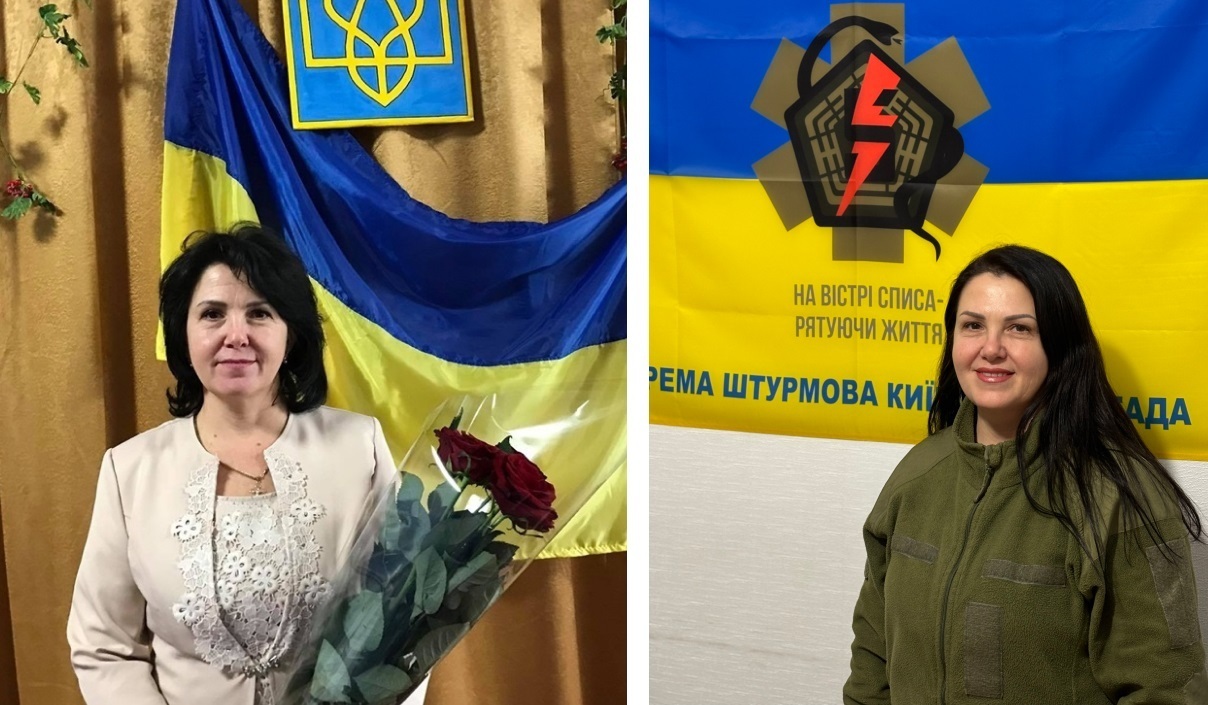
Olena Makohon, former Head of the Ukrainske village council and currently a soldier of the 5th Assault Brigade of the Armed Forces of Ukraine
The Cossack community
Olena Makohon was born and brought up in the village of Troitske, 50 km east of Pavlohrad and 40 km west of Pokrovsk, which is currently the site of fierce hostilities. The village is located in an exceptionally beautiful place, on the left bank of the Byk River, which winds like a ribbon, forming numerous estuaries and swampy lakes.
Olena’s ancestors grew up, lived their whole lives and died in this village. She assumes that they were of Cossack descent, since the Cossacks had been building their winter houses in this area since the time of Bohdan Khmelnytskyi. On the other hand, Troitske village was first documented in 1775, when a part of the pikemen of the Luhansk Pikemen Regiment, which also consisted mainly of Ukrainian Cossacks, was relocated to the west “to settle the Bakhmut and Volkovodsk steppes”. Apparently, Troitske has always been considered a village with a ‘character’ because of local residents’ hot Cossack blood.
In 1859, the village was already home to 4,500 residents. During the Ukrainian War of Independence (1918–1920), many of them joined the units of Colonel Petro Bolbochan of the Ukrainian People’s Republic, which marched through Troitske, and others joined the army of Father Makhno, whose capital, the town of Huliaipole, is located some one hundred kilometres away. Despite the Soviet policy of russification, the residents of Troitske preserved their culture and language through the turbulent twentieth century: according to the 2001 census, 95% of the locals declared Ukrainian as their native language.
They fought for the creation of their own community in 2017 in a purely Cossack manner. Despite the opposition of experts who considered the creation of a community with a population of barely 2,600 people inappropriate, the locals managed to defend their chosen structure. The residents of Troitske wanted to amalgamate exclusively with Ukrainske settlement, which eventually became the centre of the community. Although, unlike Troitske, Ukrainske did not have such a long and rich history – it was founded only in 1929 as a result of the creation of the large Dnipropetrovsk state agricultural enterprise ('radhosp') – the neighbours were united by long-standing common traditions and close economic ties. Eventually, the newly formed community included the Ukrainske and Troitske village councils, which together comprised eight localities. The area of the new amalgamation reached 386 km², which turned out to be quite large. But most importantly, the community was capable.
Olena Makohon, who at the time was the mayor of Troitske, was one of the initiators of amalgamation. She personally made all the calculations, led delegations to the regional administration, met individually with its leadership, often bringing district and regional councillors to these meetings; she argued, asked, insisted. At that time, she already had a degree in Agriculture, 10 years of work at a local agricultural enterprise and 12 years of civil service, 7 of which were as a village mayor. Interestingly, Olena was not at all afraid to leave the top position and become an ordinary starosta for the sake of the public good. However, three years later, she ran for the next local elections and became the head of the community she had fought so hard for.
‘My biggest professional achievement is the creation of the community,’ says Olena Makohon, a very pleasant and pretty woman with a soft singing voice and equally soft movements. ‘The decentralisation reform is great! Although local self-government now has many more responsibilities than before, it also has incomparably more opportunities. Previously, the district administration allocated funds manually. So if you were on good terms with the head of the administration and the head of the financial department, you could get more finance than others, regardless of whether you needed it or not. And if the relationship was bad, you could get nothing, no matter how much your village needed it. Now we plan our own income and expenses.’
Ms Makohon believes that the main advantage of creating a community is the preservation of all local infrastructure. In her opinion, if Ukrainske and Troitske were to merge with any other community, they would lose about half of their infrastructure. And people would be lost with it. Instead, the Ukrainske community is one of the few that does not have an outflow of people. Even the hostilities 40 km away from the community do not force people to leave.
Employees of the former Troitske village council, which was transformed into a starosta district after the community amalgamation, at St Peter and Paul’s Day in the former district centre of Petropavlivka. Olena Makohon, Head of the Council, standing left, 2017
Amateur performance team of the Ukrainske village cultural centre, 2021
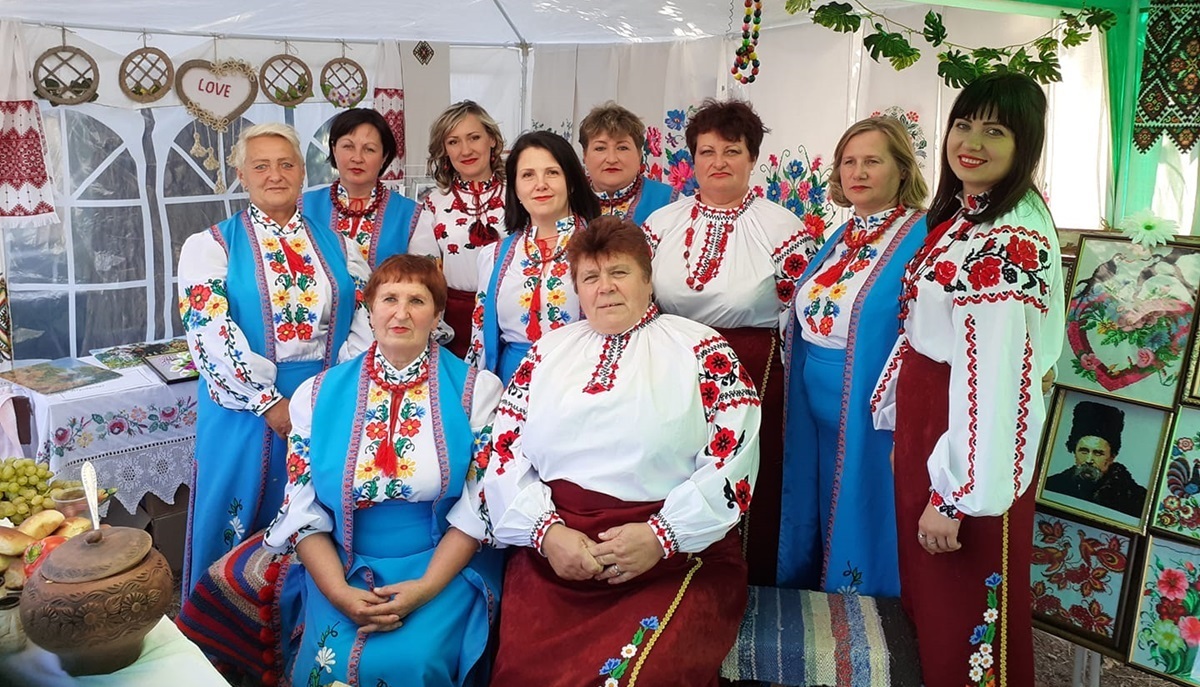
Amateur artists of the Ukrainske community, 2020
‘Krynychenka’ ensemble of the Troitske village cultural centre
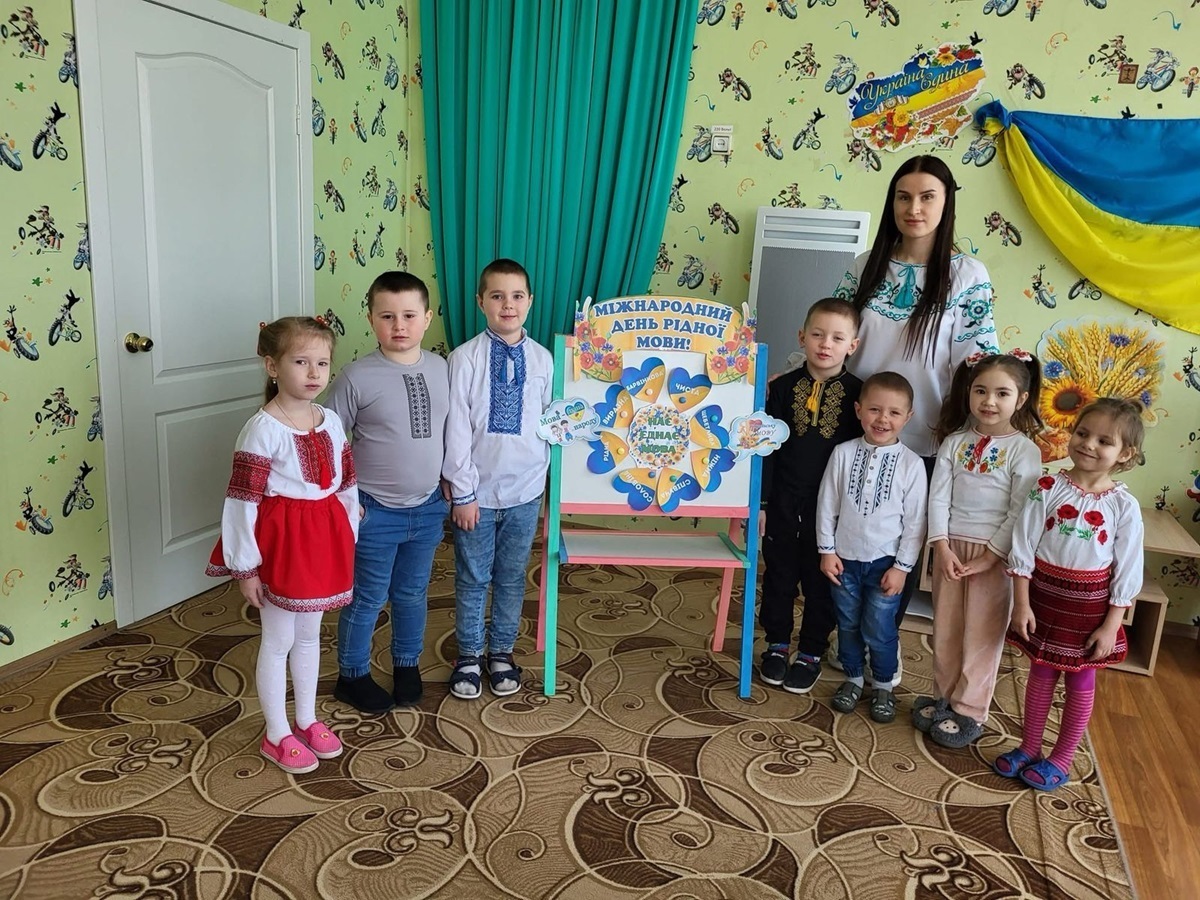
Kindergarten in Troitske village, which had been closed for 10 years and reopened only after the community amalgamation
Playground of the Troitske kindergarten
Pros and cons of a small community
The budget of the Ukrainske community is filled mainly at the expense of agricultural enterprises. Last year, it reached UAH 44 million, including UAH 30 million of own revenues. Half of the budget is spent on the maintenance of the educational sector.
Olena says that the community residents want their children to study in comfortable conditions, have quality food and the opportunity to recuperate. Therefore, the community has equipped shelters in both lyceums – in Troitske and Novoselivka – at its own expense. This allows children to study in a mixed format despite the proximity of the front line. Much attention is paid to healthcare and social protection: local residents are provided with medical services in two outpatient clinics and three primary healthcare centres. An administrative service centre was opened to provide quality administrative and social services.
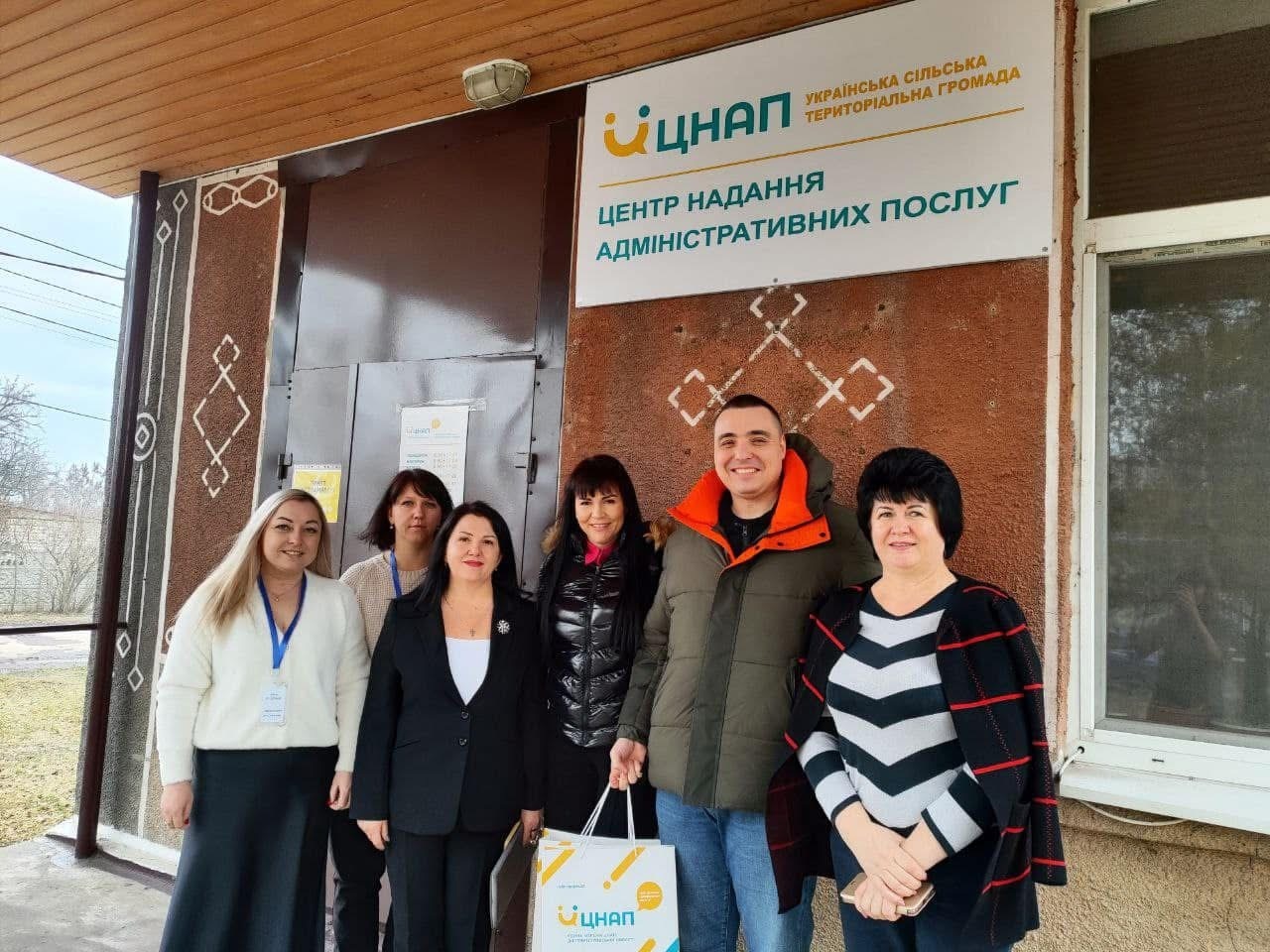
The team of the Administrative Service Centre of the Ukrainske village council with the representatives of the Dnipropetrovsk regional military administration, who attended the opening ceremony, in front of their new workplace. Olena Makohon, standing third from left, 2024
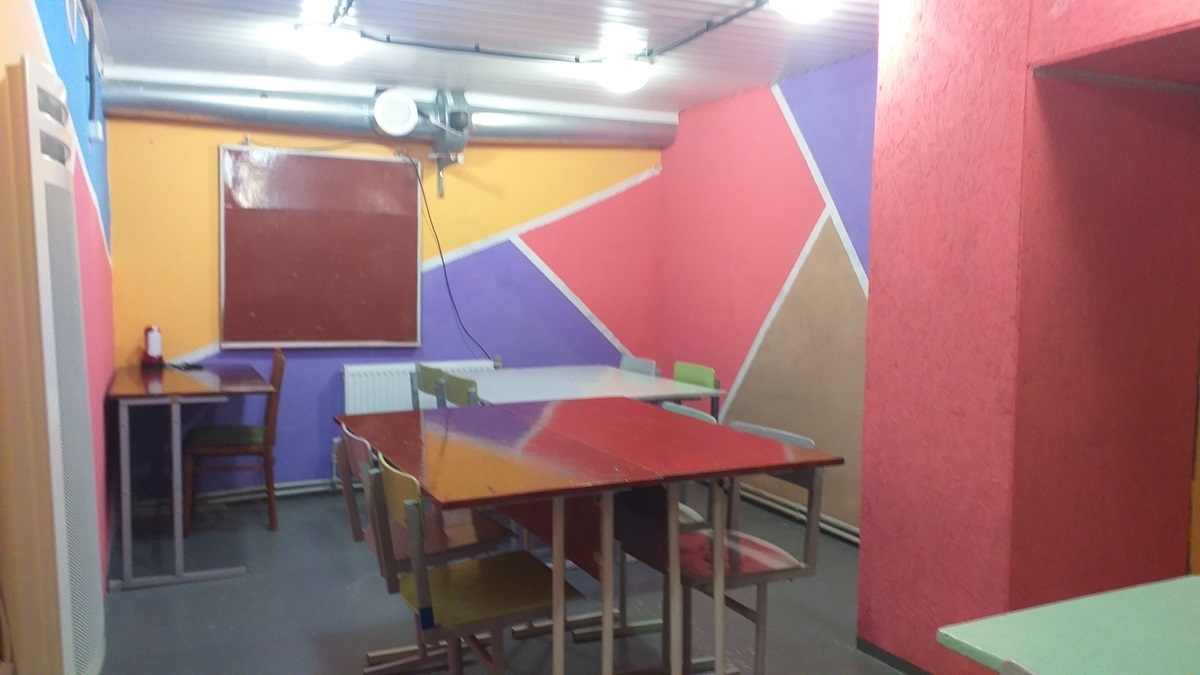
The newly arranged bomb shelter in the Novoselivka Lyceum
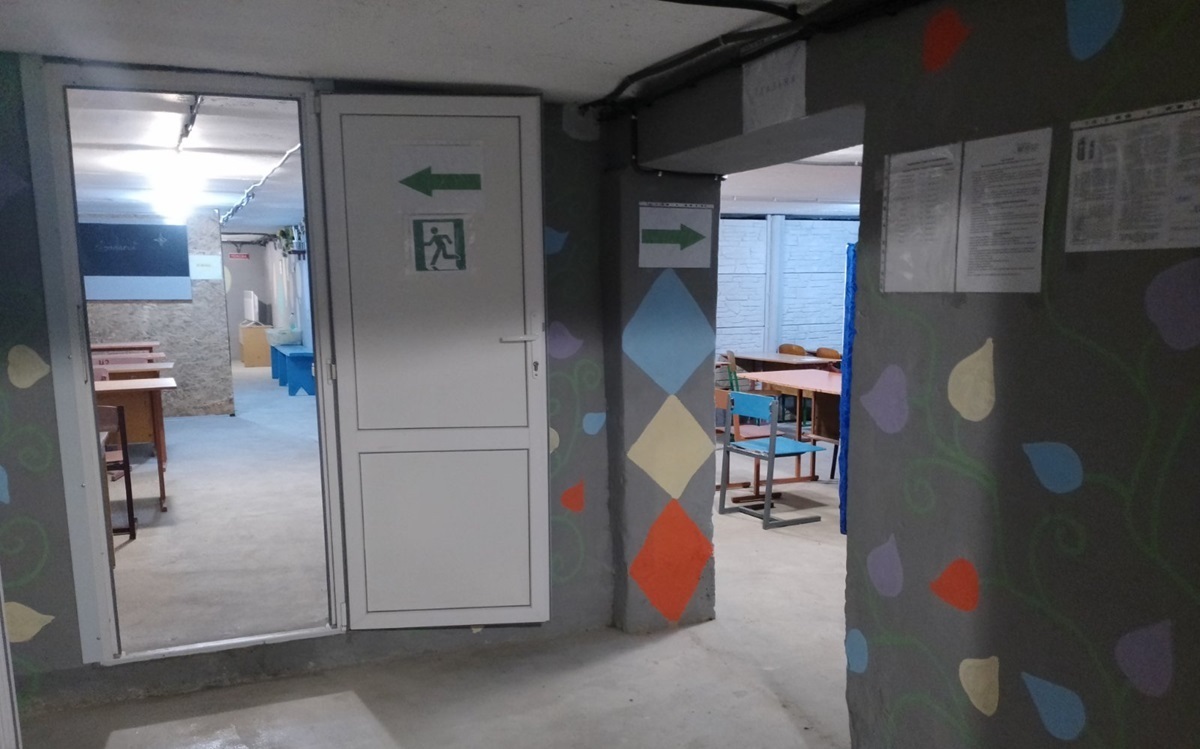
Bomb shelter in the Troitske Lyceum
On the other hand, community size has had a negative impact: there is not enough budget for global change, and it is difficult to attract the help of powerful international organisations and donors: as soon as they hear that the community is home to only 2,600 residents, they lose interest in it. Numerous projects written by the Ukrainske settlement council’s experts have mostly remained on paper. This left some global problems unresolved: the community did not create a utility company with a fleet of special vehicles and did not build a system for water purification, which is too rich in iron in this region.
‘If we had amalgamated first, like the Vakulove community, for example, it would have been much easier for us to raise funds,’ Olena sighs, ‘but the funds were hard to find in 2017. Now I see that everything is moving towards enlargement of communities. But I would like to highlight the main problem, which is worsening every year. The roads between our villages are completely broken. And these are roads of regional subordination, so the village council has no right to repair them, but can only allocate funds for co-financing. And there is no co-financing. On the other hand, our funds will be enough for about a hundred square metres, and we need to repair several dozen kilometres of roads. Petropavlivka is 17 km away. How can one get there? For example, there are two small schools: one with 120 and the other with 85 schoolchildren. We cannot even merge them, because sometimes in winter there is no connection between our villages... Before the full-scale war, it used to take 5 minutes to get from Ukrainske to Troitske, but now it takes three times longer. The road is completely broken! The lack of roads has led to the shutdown of local shops in some remote villages, and people now live there like on the island, since buses no longer go there either. Roads are the most important element for the development of any territory. Therefore, before communities are enlarged, the state should have built at least the most important roads.’
Ms Makohon is also outraged by the fact that the UAH 14 million that remained in the community budget last year, according to the latest amendments to the Budget Code, cannot be used to repair roads or other infrastructure. In her opinion, the National Government could make an exception for frontline communities whose roads have been damaged by heavy military vehicles for three years.
‘The legislation states that the budget balance can only be spent on social protection,’ Olena continues, ‘but we have never spared any money for this expenditure line. Last year, for example, we allocated UAH 2 million to support the military and their families alone. Given the size of our population, this is a lot of money.’
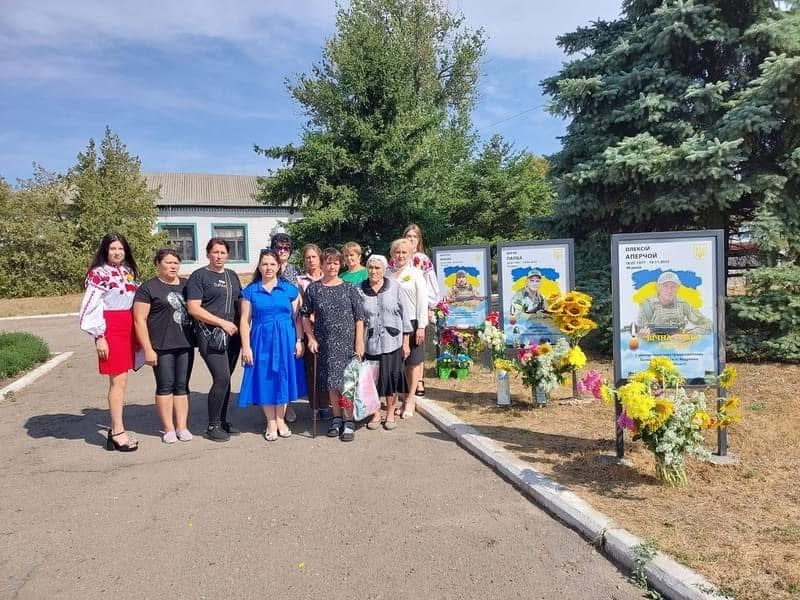
Relatives of fallen soldiers on the Alley dedicated to their memory in Ukrainske settlement
How the Head of the community learnt to shoot and personally served summonses
With the full-scale russian invasion, the Ukrainske community fully proved its name: many of its residents joined self-defence units that patrolled the streets on a voluntary basis for four months. Later, most of the fighters in these units joined the regular army. Other residents volunteered and helped the army in every possible way.
Troitske is about 20 kilometres from the Donetsk region border and is located on the E50 motorway connecting Pokrovsk and Pavlohrad cities. Therefore, the military have been frequent guests there during all three years of the war of aggression. Many of the milotary knew that the Ukrainske community would provide them with not only shelter and food, but with everything they needed. The locals donated literally everything they had to the army: bedding, blankets, mattresses, gas stoves, gas cylinders, and dishes, to name a few.
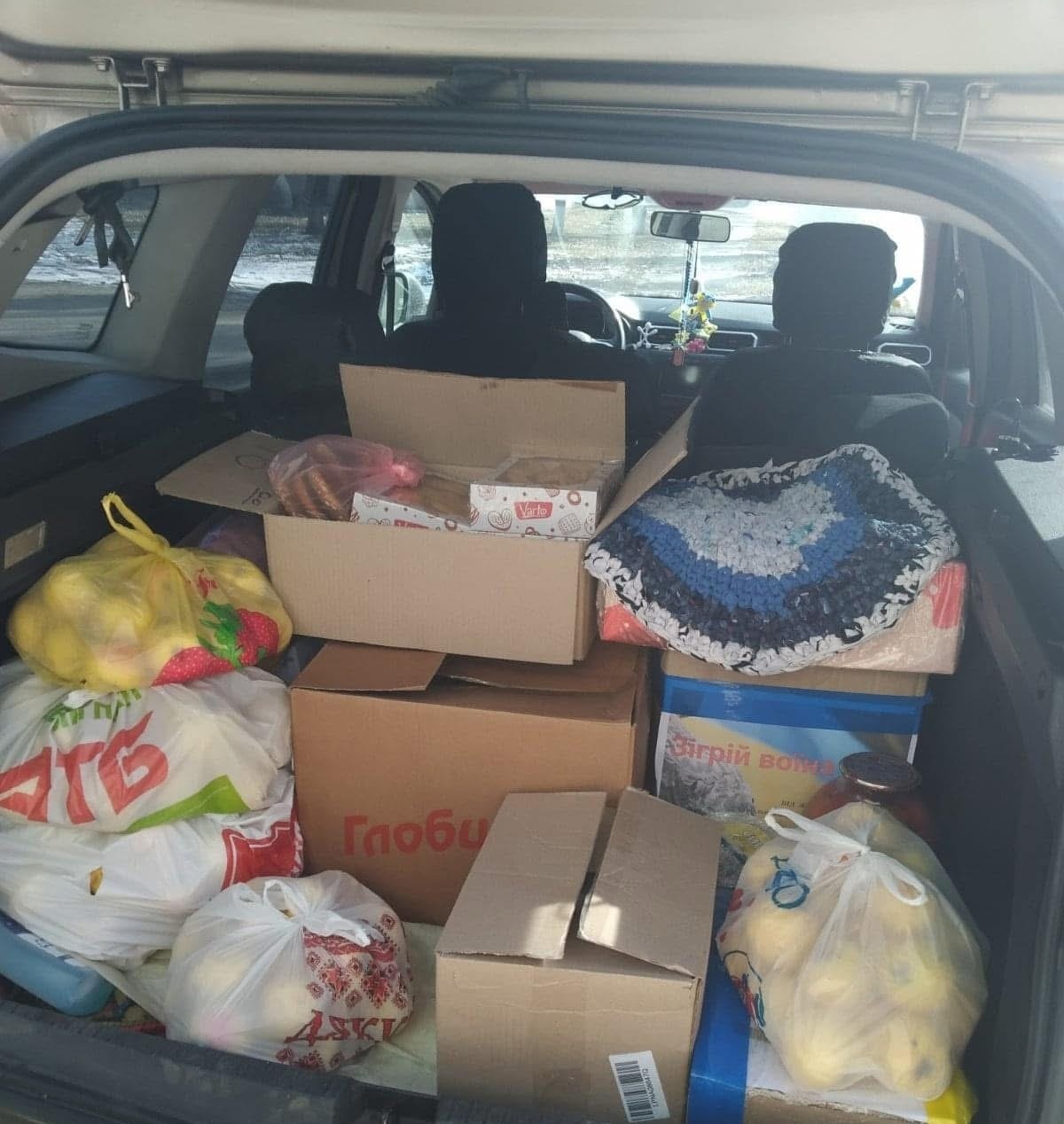
Treats from the Ukrainske community to the military. Such vehicles from the Ukrainske community go to the front line almost every week
‘The most difficult contribution to helping the army for me was serving the summonses,’ the village mayor recalls. ‘You know, people react to the summonses very differently, so some of council employees did not want to do this job. So I decided to show an example to my subordinates and personally started delivering the summonses to the houses with my colleagues. Of course, we also heard some insults, but I believed that under any circumstances we had to fulfil our duties. Although I was not supposed to be at war, the words that made me cringe the most were the following: “while the village council employees are sitting in comfortable offices, the sons and daughters of ordinary people are fighting”.’
Over the past year, the proximity of the frontline to the Ukrainske community has become increasingly noticeable: the engines of missiles and drones have been roaring above the villages every day, and various military vehicles have been moving towards Pokrovsk and returning with the wounded. Olena has repeatedly caught herself thinking that she feels a special affinity to these vehicles, to the anxious and focused soldiers in them, and even to the exhausted faces of the wounded.
‘From the very beginning of the full-scale war, I had a strong desire to join the army,’ Olena admits, ‘but I was laughing at myself: what kind of soldier I am! And my position as Head of the frontline community is, after all, very important for helping the army, so I could not say that I was standing aside from our defence. And yet, something was grinding at me from the inside, something was telling me that I could do more...’
Once, while helping the military to arrange a firing range in one of the local quarries, Olena was offered to join their training. The soldiers handed the village mayor all the small arms they had: from Kalashnikovs and machine guns to pistols. Olena fired all of them, impressing her guests with the accuracy with which she, a woman who had never picked up a weapon before, hit the targets.
Of course, she was immediately offered to join the army, but she refused. She was worried about her parents and her younger daughter, Yuliia, who was finishing her studies in Poland and, despite the war, wanted to return home as soon as possible.
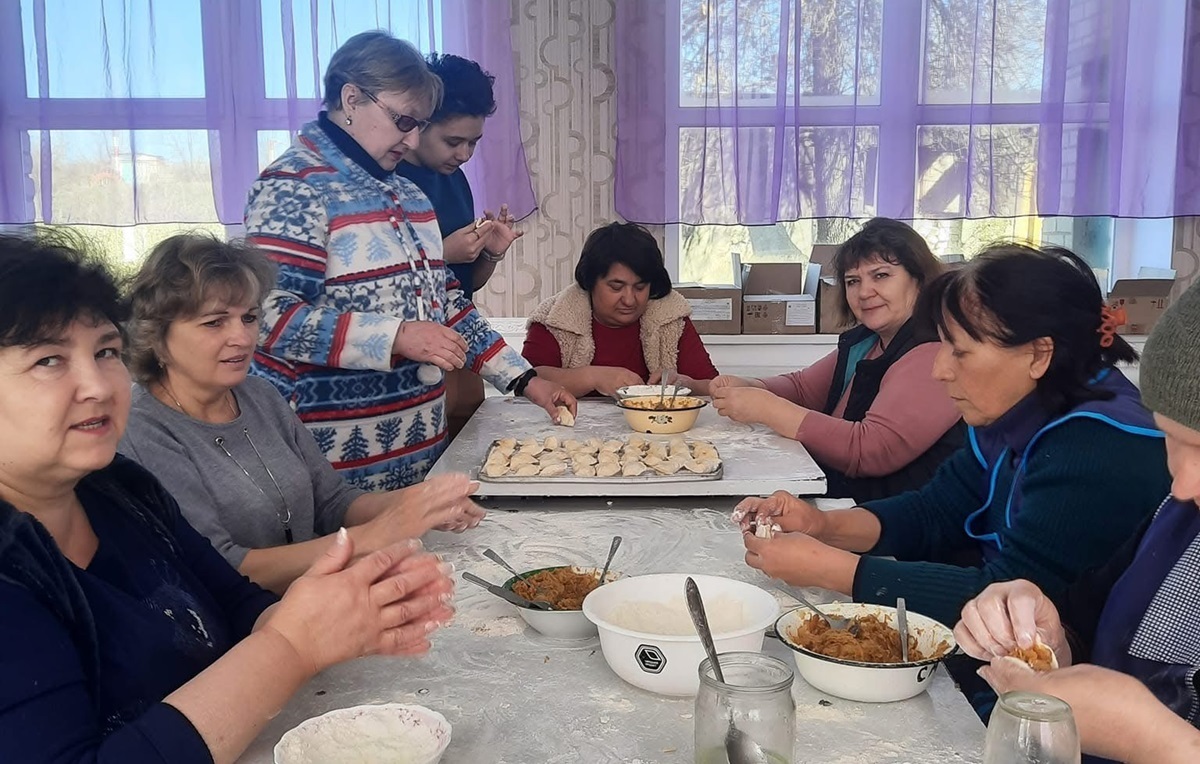
Teachers of Novoselivka Lyceum of Ukrainske community make varenyky (dumplings) for the military
A life-changing meeting
During the full-scale war, Olena has met a lot of soldiers, many of whom have become her friends. But one meeting changed her life forever.
‘Late one night, a large medical unit of the 5th Assault Brigade of the Armed Forces of Ukraine stopped in Troitske after two days on the road,’ Olena Makohon recalls, ‘I was very surprised to see a dozen girls among the guys. I immediately offered them a bath after the journey. The men stayed behind to unload their bags and set up for the night, and I asked the girls to come to my house. While they were bathing one by one, I baked them a delicious apple pie. Later, we spent a long time talking. I was extremely curious: how can girls live together with men in adapted premises? How do they cope with the everyday problems? Are they not afraid of war? How did they even dare to travel far away from home, sleep in unknown locations, live in unknown places, often without water and without a toilet? We talked for half a night, and this conversation really inspired me. I realised that a woman in the army is not so fantastic.’
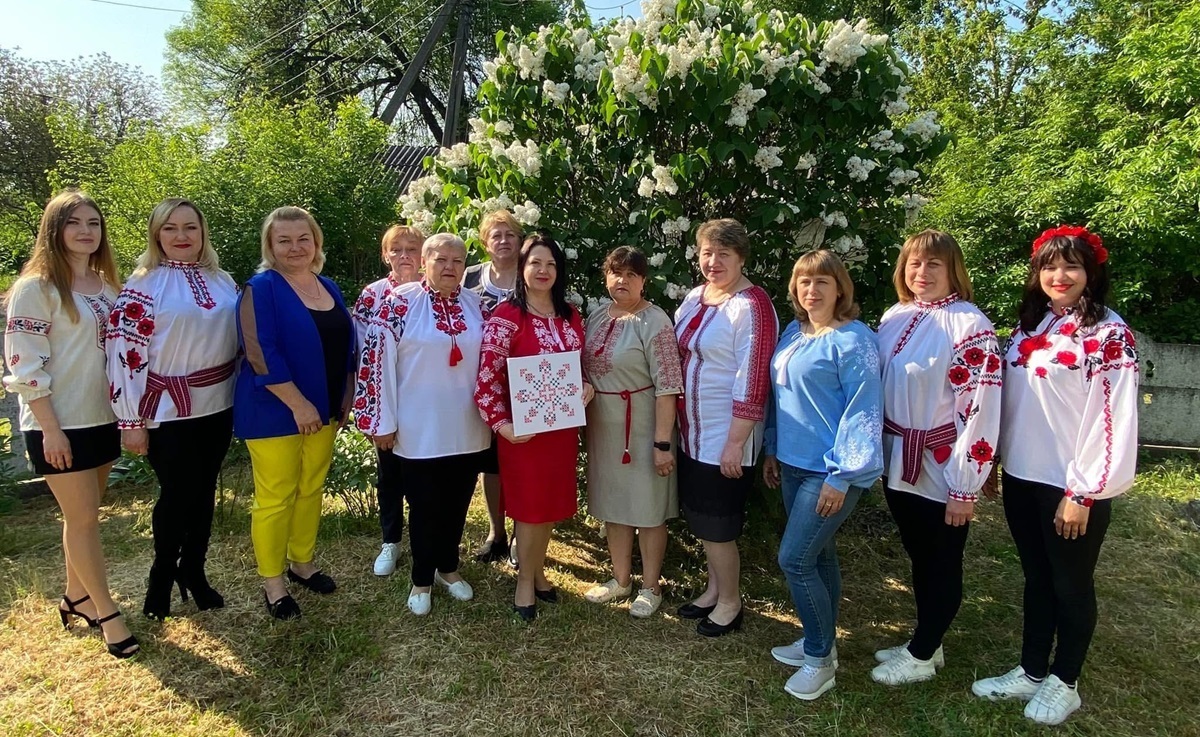
Employees of Ukrainske village council on Vyshyvanka Day in 2023. Olena Makohon stands in the centre with an embroidered pattern that encodes the word ‘Victory’
Since then, Olena has kept in touch with this unit of the 5th Assault Brigade. The paramedics also really appreciated getting to know the village mayor, as they received much help from her in all matters. One day, when Olena’s daughter came home for the holidays, Olena introduced her daughter to her new friends. Later, the girl kept in touch with them. Olena only found out that her daughter’s relationship with one of the doctors had become more than just a friendship when he was injured. Yuliia immediately returned from Poland and literally did not leave her beloved’s bedside. When the man was finally out of hospital, he asked her to marry him. Yuliia said ‘yes’, and several months ago, a daughter was born to the couple.
Olena was so happy. But at the same time, she felt that she was now... free.
‘Having sent Yuliia and my granddaughter to my son-in-law’s parents in Poltava region, where it is much calmer than here, I felt that nothing was keeping me in Troitske,’ says Olena Makohon, ‘and the thought that working in the village council was too insignificant to protect my family began to haunt me. I consulted with my friends from the 5th Assault Brigade several times. They told me that the army was experiencing a growing shortage of recruits: fewer and fewer people were being mobilised. So in the end, I made a difficult decision and joined the 5th Assault Brigade on 16 December 2024. Before that, I had settled the affairs in the community, held a budget session to approve the budget for 2025, and made several personnel decisions. I am very grateful to my parents, who understood my decision and, as always, supported me.’
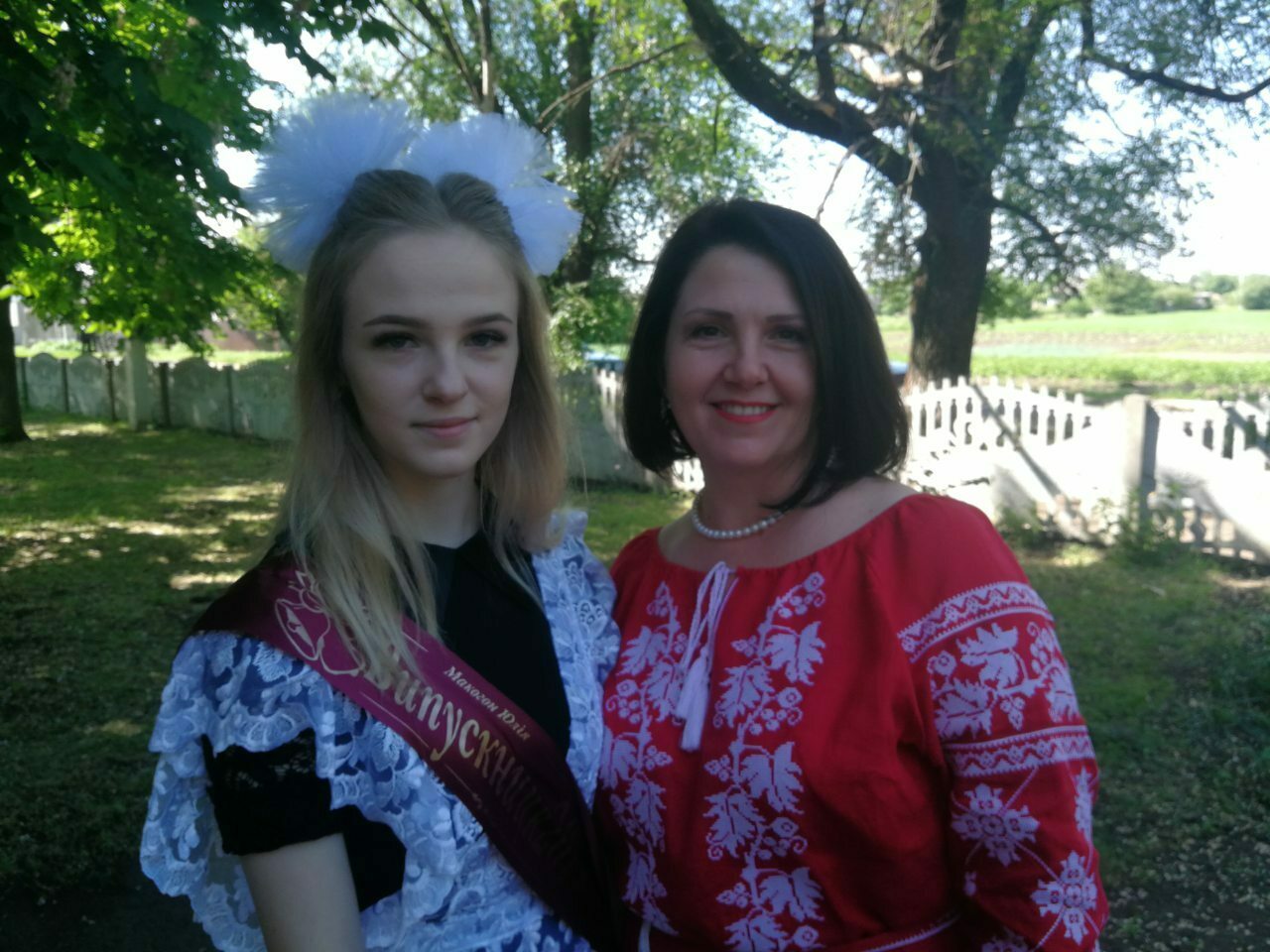
Olena Makohon with her daughter Yuliia, 2019
Residents of the Ukrainske community were shocked when they read the following post on Olena’s Facebook page one December morning:
‘Dear community!
I hereby inform you that I have decided to join the fight against the russian occupiers, who are mercilessly destroying our cities and villages, killing adults and children, and seizing our land. These thoughts have not left me since the outbreak of the war. At the moment, I finally decided to leave my comfort zone, my parents, my daughter and granddaughter and went to the east of the country. Since 16 December 2024, I have been called up for military service during mobilisation, for a special period.’
Olena’s colleagues at the village council were upset: “How will it work now? How will we manage without you?” The voters had different opinions. Some admired the woman’s courage, others thanked her for her choice and encouraged her, but there were also those who were convinced that “the village mayor stole money and joined the army to avoid being imprisoned”. Olena did not pay attention to any accusations. People are people.
A woman at war
As of now, Olena Makohon has been promoted to the rank of a recruit. After three months of service, when the basic general military training is completed, she will take the army oath and be promoted to the rank of a soldier. In view of Olena’s age and experience, she was offered a non-combat position as a medical service clerk. She was happy to take up her usual job, working with various documents and complex Excel spreadsheets.
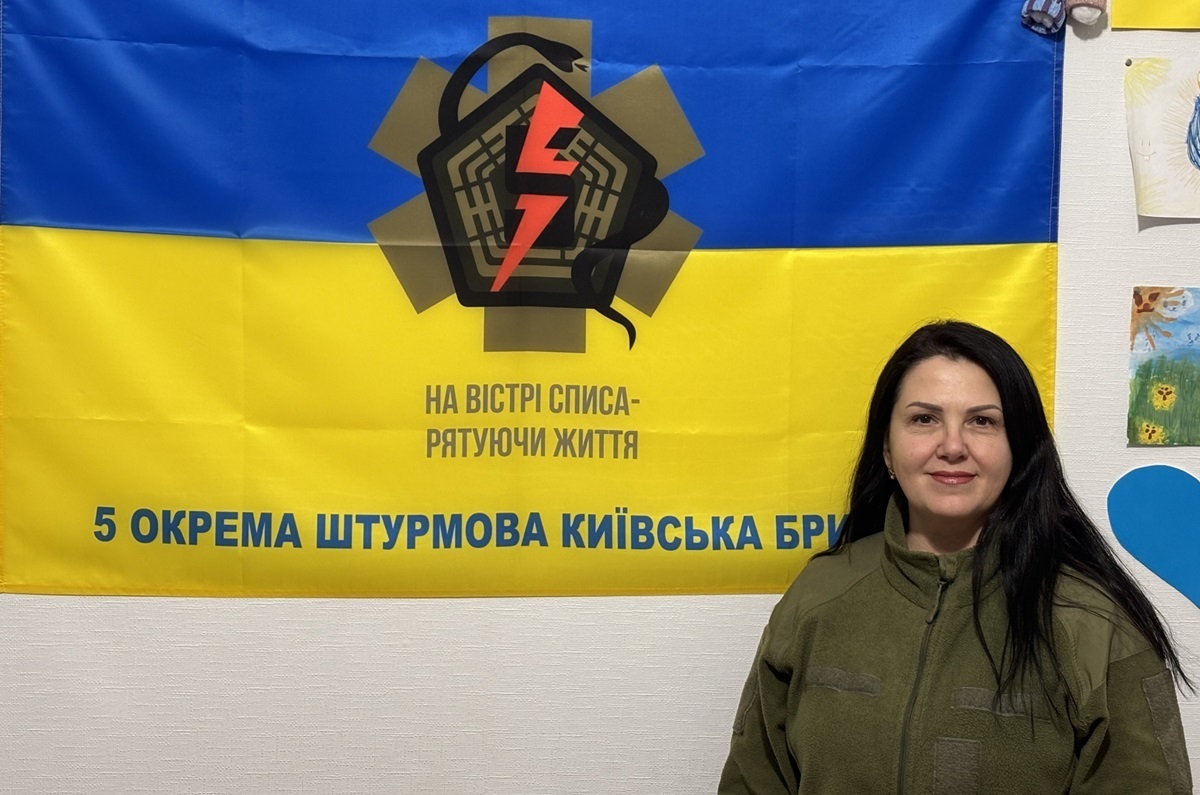
‘The army has a surprising number of vacant non-combat positions that can only be filled by experienced professionals,’ Olena Makohon shares her first discoveries in the army, ‘You cannot even appoint just anyone as a storekeeper, because there is a lot of property, you have to be responsible for it, you need to know how to register it, and so on.’
Olena says that although she now lives “in more or less comfortable conditions”, she is mentally prepared for any changes. Because she understood where she was going and why.
‘It might be a little easier for me than for others because I am a fatalist: I believe that you cannot escape your fate,’ says Olena. ‘Some people die in peacetime due to some accident, while others go through real hell completely unscathed. So one needs not be afraid, one just has to live and do what they have to do... So far, the hardest aspect of the army for me is working seven days a week. At the village council, we also often worked from morning to night, but at least we would not go to work on Saturdays and Sundays. And here we have to go. But I feel much better now, because I know that I have joined what is the most important thing in the world – saving the lives of my relatives, friends, fellow villagers and compatriots.’
Olena urges not to overestimate the role of women, both in the army and in society. In her opinion, “success does not depend on gender, but on professionalism, character, willingness to work, and inborn abilities”.
Olena believes that the role of communities in national security cannot be overestimated.
Community and the war
‘Local self-government is now responsible for mobilisation, support for the military, and accommodation for internally displaced persons,’ says Olena Makohon, ‘The original, peaceful tasks have not been cancelled: roads need to be repaired, public facilities need to be maintained. We also need to help people. Many of them are now in despair because they do not understand what will happen in the future, and this puts a lot of pressure on their psyche. So, we need the right words for everyone, to comfort them. Not to mention some material goods, which also need to be found. Thank God, we do not feel abandoned. For example, for two years now, the French NGO Triangle Génération Humanitaire has been providing our residents with fuel briquettes. People save them, saying “who knows if they will be given these briquettes for the next year”.’
Although Olena Makohon has already integrated, as she describes it, “into a different area of work,” she is aware of all the problems of local self-government. Moreover, she looks at some of them from the perspective of a military.
‘I am frankly against posting video recordings of local council sessions on the Internet, as the National Government now demands,’ she says, ‘because these sessions often make decisions that our enemies do not need to know about. This regulation should be suspended – at least until the martial law ends. I stand for transparency, but this transparency should not harm national interests and put people’s lives in danger.’
Olena also believes that some aspects of the decentralisation reform need to be improved. For example, in order to improve the local governance system, the functions of district and regional administrations should not overlap. As it is now, communities often do a lot of unnecessary paperwork. There are also many other issues that need to be put aside now, and all efforts should be directed to the fight for our VICTORY. In Ms Makohon’s opinion, there is no reason to build stadiums, install exercise equipment, replenish library collections, or prepare technical documentation for cultural heritage sites when the soldiers are dying due to a lack of weapons and equipment. ‘It raises righteous indignation and undermines the morale of the defenders.’
Olena Makohon has unconditional faith in Ukraine and its future.
‘I would like to tell the young people who are now facing the choice of whether or not to serve in the army that they have to fight for their future,’ she says. ‘My parents taught me this from the time I was a child. Now the lives and health of our loved ones and our compatriots depend on us, not on anyone else. The survival of buildings in our communities depends on us. Whether after the war, we will be able to plough our steppes without fear of landmines. Whether our schools will be safe for children to study. Whether we will be able to show our grandchildren the cities and villages we grew up in, or whether they will see only ruins instead. It is worth fighting for, it is necessary to fight for it. We have to fight for life itself!’
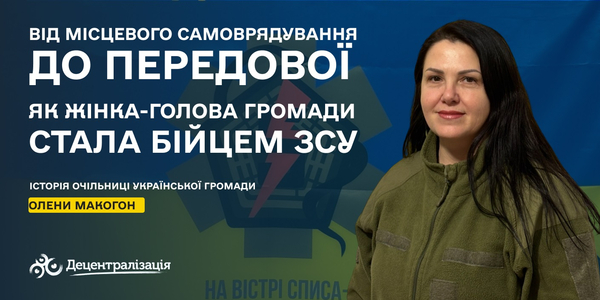
Tags:
war stories war stories special project
Область:
Дніпропетровська областьГромади:
Українська територіальна громадаSource:
Decentralization portal
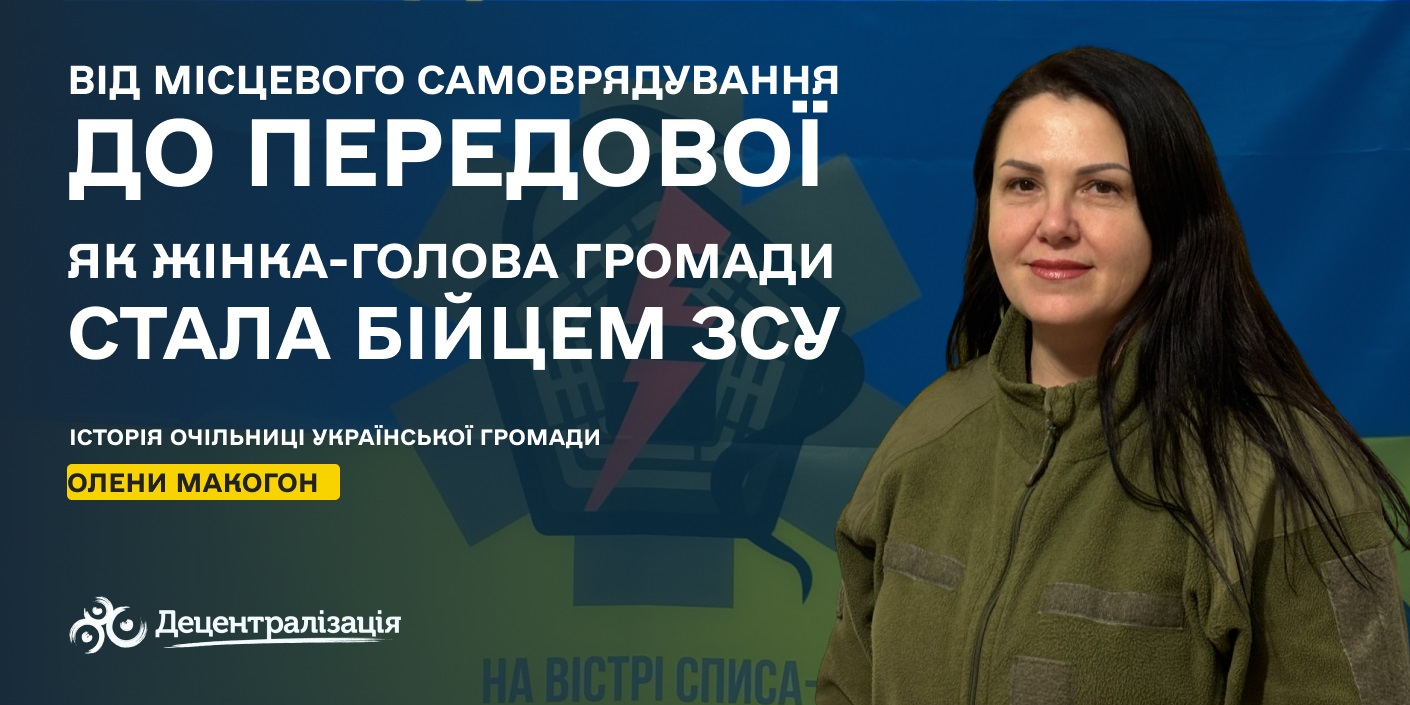
20 February 2026
Місцева статистика: Як перетворити розрізнені...
У Києві відбулася стратегічна зустріч "Статистика громад", організована Державною службою статистики України за...
20 February 2026
I_CAN розпочав масштабування по всій Україні своєї Навчальної програми з управління публічними інвестиціями для...
20 February 2026
Language of Development Part 2: Funds and Instruments of EU Cohesion Policy
Language of Development Part 2: Funds and...
With the “language of development”, we describe not only the goals and principles of EU regional policy, but also...
19 February 2026
Анонс: вебінар «Обговорення змін до Порядку...
Які практичні кроки мають здійснити керівники та педагоги, щоб ефективно впровадити ключові зміни до Порядку...

